Exploring alternatives to epoxy for garage flooring can reveal more durable, cost-effective and visually appealing options suitable for various needs.
Polyurea is a superior alternative to epoxy for garage floors. It offers enhanced durability, flexibility, and longevity, making it the ideal choice for high-traffic areas or climates with harsh weather conditions.
This article delves into the benefits of Polyurea, its application process, and why it outperforms epoxy in many aspects.
Stay tuned to understand how Polyurea could be the best solution for your garage floor, offering an in-depth comparison, installation guide, and maintenance tips.
Key takeaways:
- Polyurea is a superior alternative to epoxy for garage floors.
- Polyurea offers enhanced durability, flexibility, and longevity.
- Polyurea cures significantly faster than epoxy, within a day or two.
- Polyurea protects against moisture build-up and inhibits mold growth.
- Polyaspartic floor coating is a preferred alternative to epoxy, with quicker curing times and resistance to extreme temperatures.
Understanding the Durability of Polyurea and Epoxy
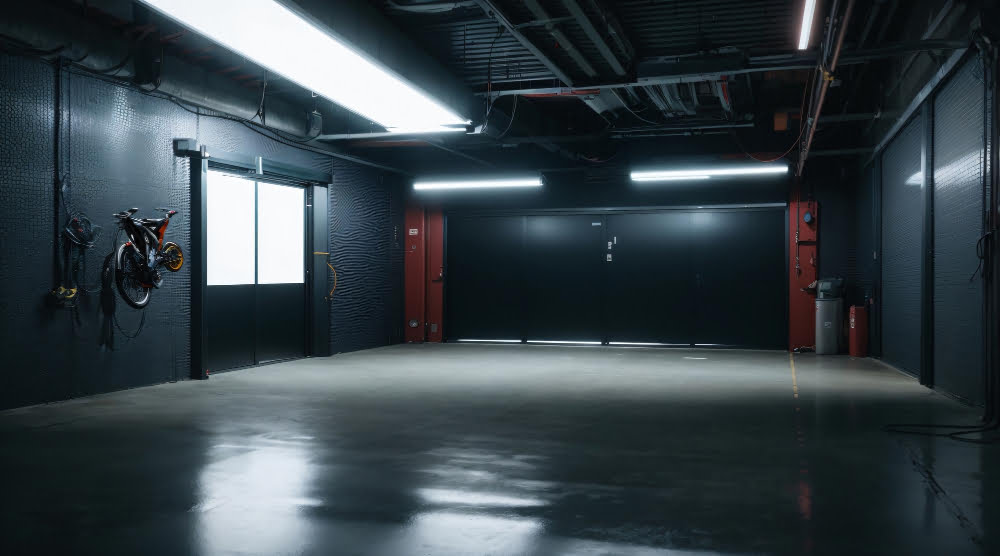
Durability is a key factor when it comes to garage floor coatings. Both polyurea and epoxy offer high performance. Yet, there exist some distinctive traits that set them apart.
Epoxy, a well-recognized solution, provides a hard, durable surface. However, it tends to become brittle over time, which makes it prone to chipping or peeling, especially under extreme temperatures or heavy impacts.
Polyurea, on the other hand, is flexible and resilient. It withstands pressure, heavy impacts, and extreme temperatures exceptionally well. Unlike epoxy, it doesn’t peel or chip, hence, ensuring longer lifespan.
Moreover, polyurea cure time is significantly shorter – it can be completely cured within a day or two, whereas epoxy requires a minimum of 72 hours. This means that you can utilize your garage sooner with polyurea.
So while both materials are indeed durable, depending on your unique circumstances, you might find the benefits of polyurea more compelling.
Polyurea Vs Epoxy – A Detailed Comparison
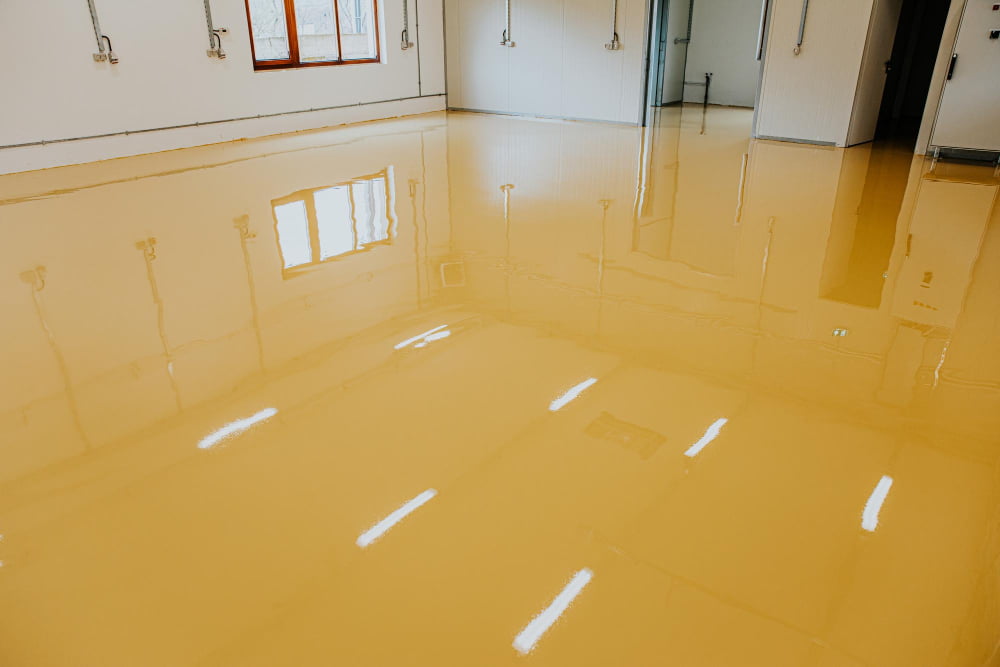
When comparing these two durable options, several key distinctions emerge.
Firstly, polyurea surpasses epoxy in terms of flexibility; it is about 20 times stronger and retains this strength across a broad temperature range. This quality allows polyurea to withstand the fluctuating garage temperatures better than epoxy, making it less likely to crack with time.
Secondly, the curing times of these materials. Polyurea cures significantly faster than epoxy – often in just 1-2 hours as compared to the 24-72 hour curing time that epoxy typically requires. This fast cure feature of polyurea will enable the restored use of the garage in a fraction of the time.
Lastly, UV stability. Over time, an epoxy floor can yellow or fade in color when exposed to sunlight – a process called “ambering”. In contrast, a polyurea-based coating is UV stable, thus retaining its color and gloss longer.
Moisture Protection Offered By Polyurea Garage Floor Coating
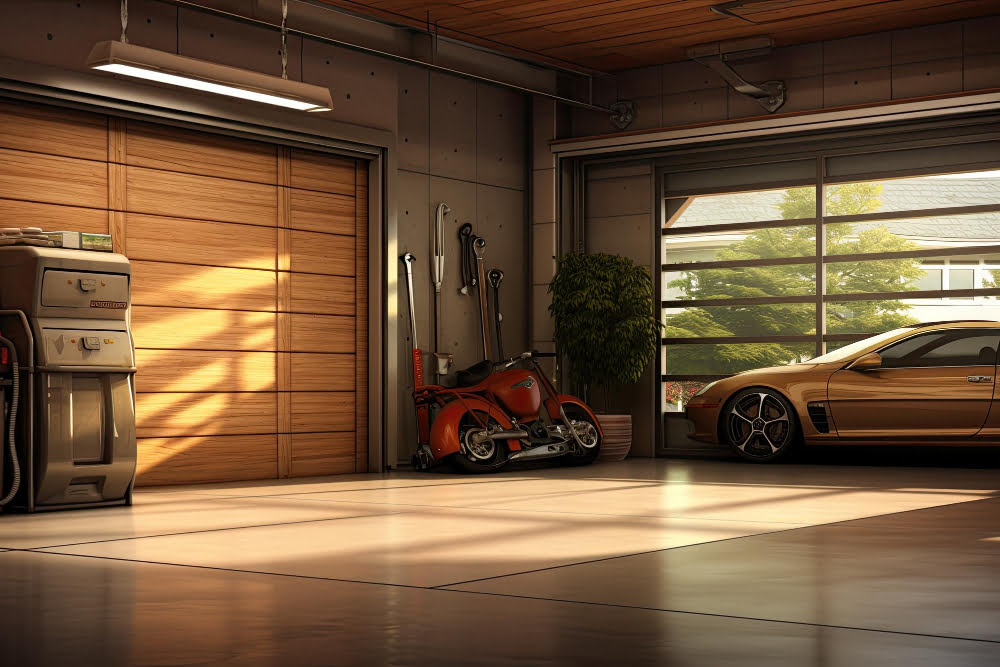
Polyurea excels in protecting garage floors against moisture build-up. Its chemical composition grants it exceptional waterproofing abilities, preventing any liquid seepage into the concrete beneath.
This is vital for garages located in regions experiencing regular rain or humidity to prevent structural damage.
As polyurea bonds directly to the concrete floor, it successfully seals off any pores, thereby inhibiting the permeation of moisture.
This property additionally guards against mold or mildew growth, ensuring a healthier environment.
It’s critical to remember that a well-defended floor extends the lifespan of your garage and cuts down on potential costly repairs.
Potential Adhesion Issues With Epoxy Garage Floor Coatings
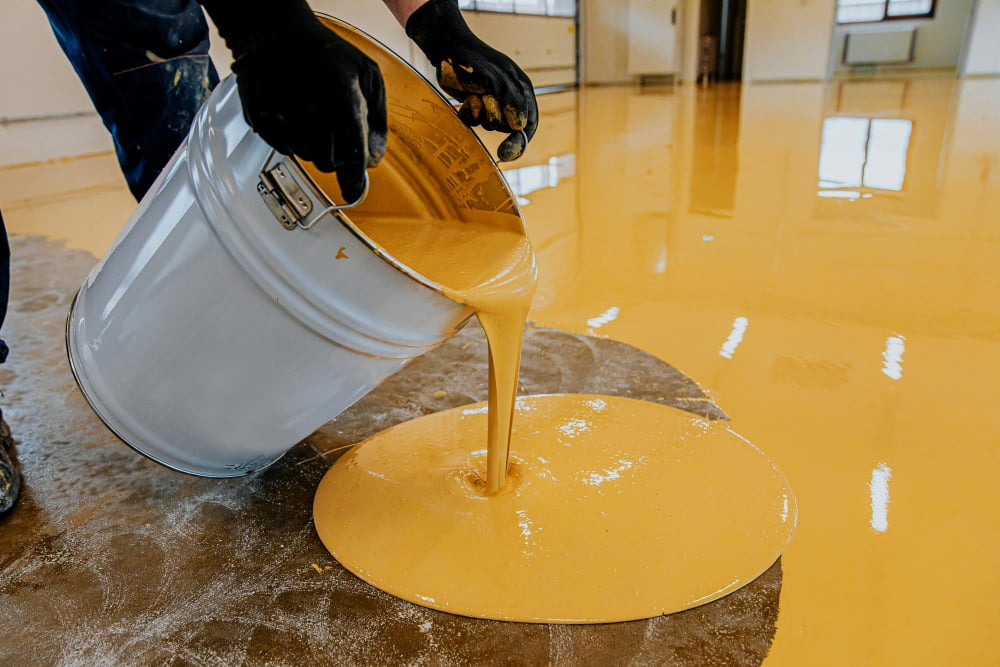
Epoxy, despite its many merits, often presents issues related to adhesion upon application. Firstly, it’s not very forgiving to imperfect surface condition. Ideally, the concrete must be clean and free of any oil, grease, dust or other surface contaminants. Even a small amount of residual moisture can lead to an improper bond between epoxy and the floor, resulting in peeling or chipping.
Furthermore, epoxy requires a well-prepared surface for application, typically involving acid etching, grinding, or shot blasting. The condition of the concrete, its moisture content and the preparation process are all crucial to effective epoxy adhesion. It’s also worth noting that epoxy requires a longer curing time—sometimes up to 72 hours—depending on temperature and humidity levels. Abrupt changes in these conditions during the curing period can impact the adhesion quality.
Finally, epoxy is sensitive to UV radiation, which over time can lead to discoloration and a reduction in its adhesive properties. For those looking to avoid this issue, consider a UV-stable alternative like polyurea or polyaspartic coating instead.
Why a Polyaspartic Floor Coating Is a Preferred Alternative to Epoxy for Garage Floors
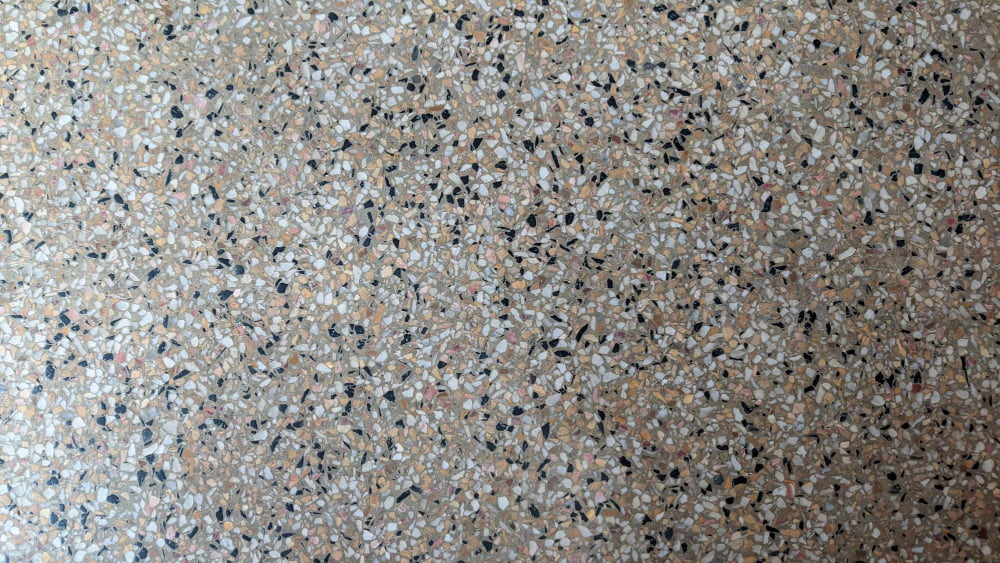
With a variety of garage flooring options available in the market, polyaspartic floor coating stands out from the crowd for a multitude of reasons. It has an exceptional level of resistance to abrasion, arguably much higher than epoxy. It also withstands chemical spills and UV rays without discoloring, preserving the aesthetic appeal for a longer time.
Polyaspartic coating is also renowned for its quick curing speed. Unlike epoxy, polyaspartic can be applied and cured in a single day. This is a significant advantage for those who want to avoid the lengthy downtime associated with epoxy coatings, letting you utilize your garage sooner.
Lastly, but importantly, this type of coating handles extreme temperature variations without peeling or cracking – a common issue with epoxy. Polyaspartic coatings stay flexible and strong, even in extreme cold or hot conditions, ensuring a durable and long-lasting finish for your garage floor. This makes it a robust choice if you live in a region that experiences drastic temperature changes.
Detailed Process of Garage Floor Installation With Polyaspartic Coating
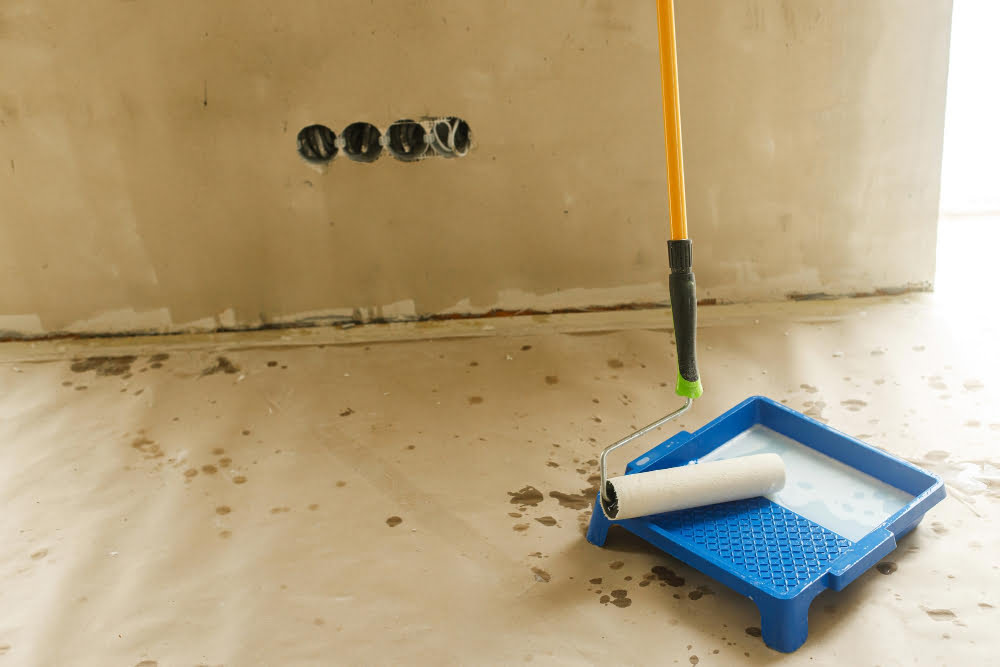
Upon selecting a polyaspartic coating, it is important to follow a few key steps to ensure a successful installation.
1. Surface Preparation: Analysing your existing garage floor condition is essential. Remove any previous coverings and sealers, and patch cracks or chips before you proceed. A clean, dull, and dry surface is optimal for effective adherence of the coating.
2. Priming: Once the surface is ready, apply a prime coat of polyaspartic. This layer serves as a base and guarantees a strong bond between the surface and the layer to be applied later.
3. Applying the Coating: The next step is the application of the actual polyaspartic coating. Always ensure an even spread across the surface to avoid clumps and uneven regions.
4. Decorative Chips: If you desire a decorative finish, broadcast chips into the wet layer of polyaspartic, then let it dry.
5. Final Coat: A clear final coat seals in the chips and provides a glossy finish. This layer is critical – it offers enhancement to the floor’s durability and resistance.
6. Curing Time: Allow at least a day for the coating to cure. Traffic and heavy items should be avoided for several days post installation.
Remember, it’s always advisable to seek professional assistance when unfamiliar with the process.
Methods for Maintaining and Cleaning Your Polyaspartic Garage Floor Coatings
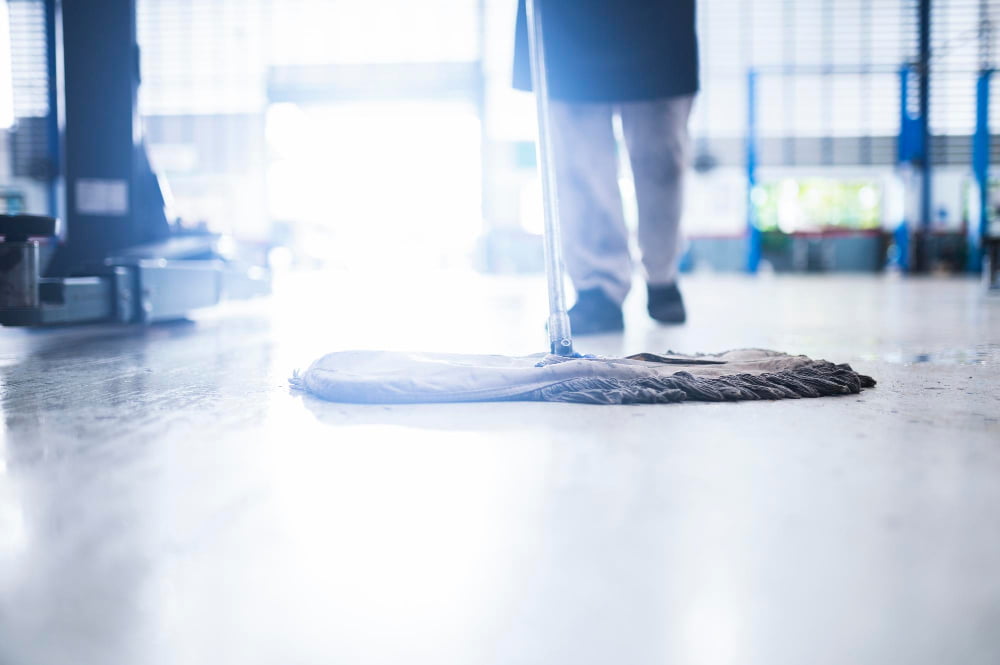
Maintaining and cleaning a polyaspartic garage floor coating is straightforward and requires minimal effort. Regular sweeping or dust mopping helps to reduce the accumulation of dirt and grime. Spills are not a worry as they can be cleaned up easily with a soft cloth or sponge.
Stubborn stains often lift with a few swipes of a mop and a mild, non-abrasive cleaner. While polyaspartic floor coatings are chemically resistant, it’s best to avoid harsh chemicals for daily cleaning to ensure the longevity and luster of your garage floor.
Interestingly, pressure washing is a viable option for thorough cleansing without harming the surface. Tire marks? Scrub with a soft brush and warm, soapy water. Keep your floor dry as much as possible, although polyaspartic coatings are UV-ray and water-resistant, consistent dryness enhances its durability.
Remember to periodically check the floor for damage. While the polyaspartic coating offers robust protection, unprecedented impacts or sharp objects might cause minimal harm, which can be professionally rectified if addressed promptly.
Ideal maintenance combines routine cleaning with professional inspections every few years, keeping your garage floor sharp and shiny while extending its lifespan.
FAQ
Is there something better than epoxy for garage floor?
Yes, polyurea is considered better than epoxy for garage floors due to its superior resistance to chemicals, UV stability, and its exceptional ability to protect floors from stains, damage, chemicals, and wear.
What floor coating is better than epoxy?
Polyurea floor coating is superior to epoxy due to its enhanced protection, longer-lasting appearance, faster curing time, and increased safety.
Is polyurea really better than epoxy?
Yes, polyurea is indeed superior to epoxy due to its higher durability and extended life expectancy of approximately 15 years compared to epoxy’s three to five years, saving both time and money.
What advantages does polyurethane offer over epoxy for garage flooring?
Polyurethane offers advantages over epoxy for garage flooring as it’s more flexible, UV resistant, and offers a more durable finish that can withstand higher levels of wear and tear.
Can polyaspartic coatings outperform epoxy for garage floor use?
Yes, polyaspartic coatings can outperform epoxy for garage floor use due to their higher resistance to abrasion, chemicals, and UV light, as well as faster curing times.
Are there any modern alternatives to epoxy that provide a more durable garage floor?
Yes, polyaspartic and polyurea floor coatings are modern alternatives to epoxy that offer greater durability and quicker curing times for garage floors.